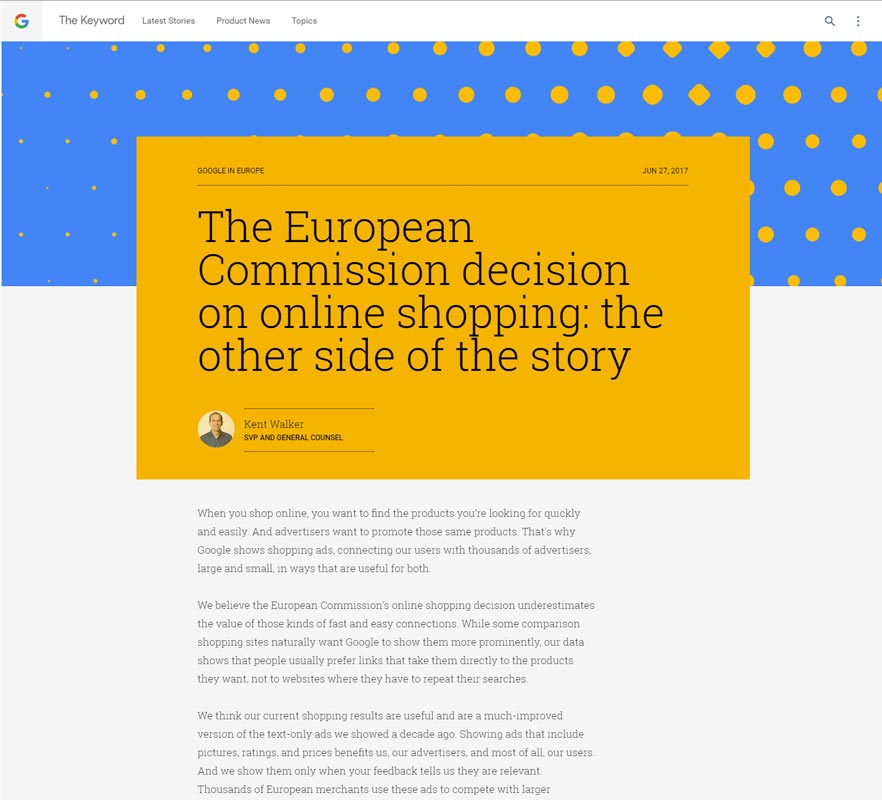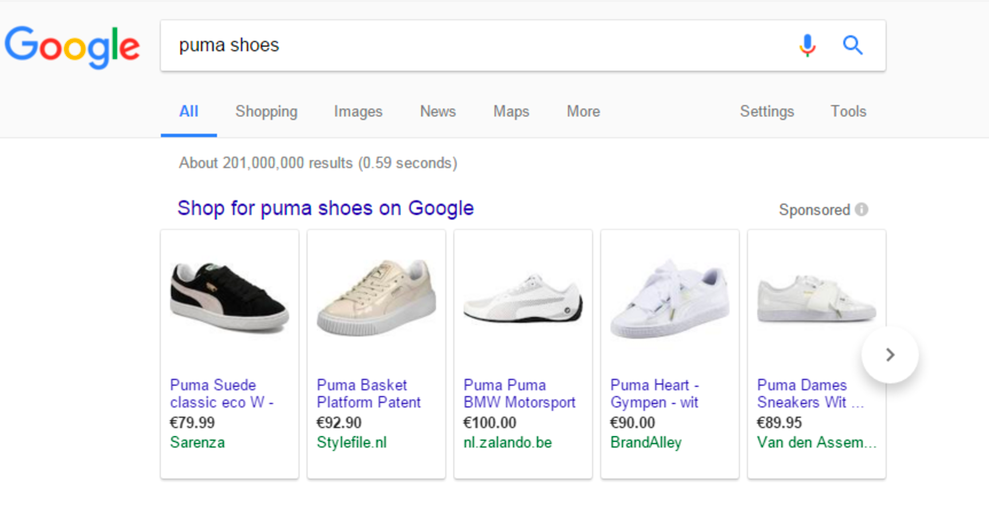FairSearch response to “The European Commission decision on online shopping: the other side of the story”
On 27 June, Google’s General Counsel, Kent Walker, published a blog post commenting on the European Commission decision finding that Google has harmed competition in the market for comparison shopping services since 2008 and requiring that Google change its conduct to bring the infringement to an end.
As in previous blogs, this one post suffers from factual errors, contradictions, misrepresentations and unsound analysis. FairSearch again comments on some of the blatantly baseless arguments presented in Kent Walker’s post below.

Kent Walker’s blog post
Original text of Google blog follows in green, with FairSearch’s response in blue:
“When you shop online, you want to find the products you’re looking for quickly and easily. And advertisers want to promote those same products. That’s why Google shows shopping ads, connecting our users with thousands of advertisers, large and small, in ways that are useful for both.
We believe the European Commission’s online shopping decision underestimates the value of those kinds of fast and easy connections.”
FairSearch Response: Comparison shopping results from other providers could just as easily provide those fast and easy connections. The European Commission has never suggested that there is little value in “fast and easy connections” between users and advertisers, because this is not the subject matter of the case. The European Commission decision condemns Google for promoting quick and easy connections by users only to Google’s own comparison shopping results by favouring its own services, while at the same hindering consumers’ access to competing comparison services. The European Commission came to the conclusion that the results users can find “quickly and easily” are not those that are the most relevant to their queries, but those that line Google’s pockets.
“While some comparison shopping sites naturally want Google to show them more prominently, our data show that people usually prefer links that take them directly to the products they want, not to websites where they have to repeat their searches.”
FairSearch Response: Again, third party comparison shopping sites could just as easily provide links that take them to the products consumers want. However, Google reserves this form of display of comparison shopping results for itself. The European Commission’s comparison shopping case is not about comparison sites wanting Google to show their sites more prominently than Google’s, but about Google treating all comparison shopping sites fairly and not giving Google’s own comparison site a leg up by reserving favourable positioning and display to Google, rather than ranking and displaying comparison shopping sites based on relevance to the user. One of the ways Google favours its comparison shopping service is by showing direct links to products from its own service on the SERP, while competitors cannot do so even when their results are more relevant. Whatever the format of Google’s own shopping service, it should ensure that both its own service and competing ones are ranked based on relevance rather than on commercial benefit to Google.
“We think our current shopping results are useful and are a much-improved version of the text-only ads we showed a decade ago. Showing ads that include pictures, ratings, and prices benefits us, our advertisers, and most of all, our users.”
FairSearch Response: Google tries to muddle the debate by characterising its shopping results service as “ads.” However, as the Commission establishes in the Decision, Google’s shopping results constitute a standalone service and the same economic activity as comparison shopping services.
Moreover, the Commission in no way suggests that shopping results that include pictures, ratings and prices are bad, or that Google would be prevented from presenting its shopping results in any such format. Instead, the Decision takes issue with the fact that Google consistently preferences its own shopping results to the detriment of third party shopping sites, among other ways by reserving attractive and informative means of display solely to its own comparison shopping service.
Nothing in the Commission’s decision requires Google to return to the ten blue links of the past or to abandon its current way of displaying comparison shopping results. And nothing in the decision prevents Google from innovating and presenting such results in new ways. All Google must do is to treat all comparison shopping services equally, and it can easily do so while maintaining its current manner of displaying results. However, the introduction of improved ways of displaying shopping results should not be reserved to Google, if by doing so Google preferences its own shopping results on its general search page.
“And we show them only when your feedback tells us they are relevant.”
FairSearch Response: If Google displays its own comparison shopping service results at the top in response to a product-related query, this presumably indicates that feedback Google receives tells it that its comparison shopping results are (the most) relevant. Yet Google does not display comparison shopping results that are the most relevant. It consistently displays its own results on top regardless of whether they are the most relevant, or whether a third party is actually able to provide more relevant results. As studies by the Financial Times and Consumer Watchdog have shown, Google provides customers with less relevant results and higher prices. In fact, these studies show shoppers who buy from Google’s listings pay more than they need to about 85 per cent of the time.
“Thousands of European merchants use these ads to compete with larger companies like Amazon and eBay.”
FairSearch Response: Thousands of European merchants promote products in comparison shopping services, but as a result of Google’s practices, they increasingly have only one effective choice for doing so, namely Google’s service. Google has previously argued its comparison shopping service competes directly with Amazon and eBay, but as it correctly points out here, and as the Commission decision establishes, Amazon and eBay are more aptly assimilated with competitors of the merchants, not of the comparison shopping sites on which merchants advertise. The Commission has rightly established based on extensive evidence that comparison shopping and merchant services are separate markets.

“When the Commission asks why some comparison websites have not done as well as others, we think it should consider the many sites that have grown in this period–including platforms like Amazon and eBay. With its comparison tools, reviews, millions of retailers, and vast range of products from sneakers to groceries, Amazon is a formidable competitor and has become the first port of call for product searches. And as Amazon has grown, it’s natural that some comparison services have proven less popular than others.”
FairSearch Response: Google confuses comparison shopping sites with sites such as Amazon and eBay (which immediately above Google itself characterises as competitors to “European merchants,” rather than competitors to comparison shopping services). The fact that sites such as merchant sites, which, as established by the Decision are on a different market from comparison shopping services (see above) has no bearing on the harm suffered by players on the comparison shopping services market. As the Commissioner highlighted in her press conference, the European Commission has at its disposal concrete evidence that the loss of traffic by competing comparison shopping services to Google’s own comparison shopping service is linked to Google’s favourable treatment of its own service and the introduction of rules demoting competing comparison shopping services on the Google’s search result pages – not to the growth of Amazon or any one or other merchant service. Contrary to what Google suggests, there is no causal relationship between the growth of merchant services and the decline of comparison shopping services. Rather, this decline is a result of Google’s actions.
“We compete with Amazon and other sites for shopping-related searches by showing ever more useful product information.”
FairSearch Response: Again Google deliberately confuses different markets: comparison shopping sites and merchant sites. Users go to Amazon and eBay to buy things, not to look for the best places to buy things. An efficient price comparison market facilitates efficient competition between merchants and allows small merchants to compete against big players.
Google itself insisted on the different nature of comparison shopping services and merchant platforms like Amazon and eBay by putting forward remedy proposals during the course of the procedure that purposefully and expressly excluded merchant sites such as Amazon and eBay.
As noted above, just as other price comparison sites do, Google’s product comparison service is by no means prevented from providing “ever more useful product information.” However, the display of comparison shopping services on Google’s general search results pages should not favour Google’s service and/or degrade third party services.
“When you use Google to search for products, we try to give you what you’re looking for. Our ability to do that well isn’t favoring ourselves, or any particular site or seller–it’s the result of hard work and constant innovation, based on user feedback.”
FairSearch Response: Every comparison shopping service tries to give the user what she/he is looking for. As noted above, Google ends up making users worse off, by consistently showing Google’s own results, rather than the most relevant results. Thus Google is not showing comparison shopping results the user is looking for. Only Google itself (and in particular perhaps its Chief Financial Officer) can believe that can be characterized as doing something “well”.
Google is certainly not showing the most relevant comparison shopping results to users by consistently favouring its own comparison shopping service. If Google had been so sure that its results would be the most relevant, it would not have decided to shelter its shopping results from the general ranking algorithms that are applied to competing comparison shopping services.
By favouring its own service and demoting competing ones, Google is not competing on the merits and has effectively rigged the competitive playing field. No matter what third party comparison shopping services did/do, and no matter how good they are or how much they innovated, Google’s shopping results always appeared on top and more prominently. That is not a level playing field on which Google distinguishes itself by hard work and innovation; that is a playing field on which third parties are deprived of the opportunity to compete on the merits and bring innovations to market through their own hard work.
“Given the evidence, we respectfully disagree with the conclusions announced today. We will review the Commission’s decision in detail as we consider an appeal, and we look forward to continuing to make our case.”
FairSearch Response: The European Commission’s decision is founded on a truly massive evidentiary record and well-established legal principles.
Google should take heed of the precedent created by the Comparison Shopping Decision, and ensure that it applies the principles contained therein not just to its comparison shopping service, but also to the other specialised services to which it applies its favouring conduct. Images, local, maps, and travel are but a few areas in which Google abusively favours its own services by leveraging its monopoly in general search. Google can only ignore the full significance of the Comparison Shopping Decision at its own peril. If Google refuses to learn from its past transgressions and adapt its behaviour across its specialised search offerings, enforcers and private parties across Europe will undoubtedly ensure it does.
FairSearch conclusion
Google’s thin defence relies on false and misleading statements regarding what the Commission Decision is about and what the Commission’s investigation has found. Both its factual and legal defences are based on straw men propositions aimed at moving the debate away from the real issues. Nothing new there: it is the same tactic the general public has been confronted with from monopolies that have abused their dominant positions since the beginning of competition law enforcement. Google should treat its users with more respect.
